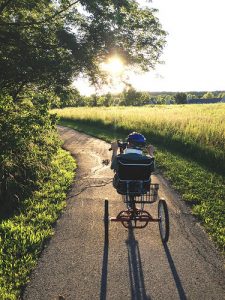
By: OakleyOriginals
What is Parkinson’s Disease?
- Parkinson’s Disease (PD) is a progressive neurogenerative disease that affects a specific area of the brain and results in decreased production of the neurotransmitter, dopamine.
- Symptoms include tremors, balance deficiencies, stooped posture, speech abnormalities, swallowing difficulties, cognitive deficits, and difficulty with fine motor tasks.
- Symptoms are treated with Medication Therapy, Physical Rehabilitation (PT, OT, SLP), Exercise and Surgical Implantation of Deep Brain Stimulator (DBS) which minimizes PD symptoms.
- At this time, there is no cure for Parkinson’s Disease.
What can I do to Manage PD?
Listed below are strategies that can be implemented by a person living with Parkinson’s Disease to manage symptoms, slow disease progression and live well with PD.
1) Exercise, Exercise, Exercise
- Exercise provides many benefits to a person with Parkinson’s Disease. Not only do you benefit from increased strength and endurance , but exercise also intervenes and corrects the non – motor symptoms of PD, such as anxiety and depression. The video above focuses on the physical and psychosocial benefits of exercise for people with PD. Jim Choi’s gym offers cycling, yoga, dance, tai chi and boxing to increase strength, endurance, as well as provide support and a sense of community.
- Current research indicates that exercise also provides neuroprotective benefits and interferes with brain cell degeneration and disease progression. The research study published in the British Journal of Neuroscience Nursing (2008) found that exercise acts to protect the brain in two different ways: 1) Exercise increases calcium cells which yields increased presence of dopamine 2) Exercise activates anti-inflammatory properties which interferes with the degeneration of the dopamine containing neuronal cell (Ahmed, 2008, p. 525).
- The results of the study mentioned above indicate that exercise is important to slowing the progression of PD, as well as vitally important for the prevention of the disease. (Ahmed, 2008, p. 528)
2) Educate Yourself on PD!
- In the video above, Dr. Subramanian discusses the importance of the PD patient becoming familiar with the disease. She suggests reading the informative material and current research on PD, joining support groups, and acquiring a doctor you trust and can speak honestly to about symptoms of the disease – without minimizing them so that they can be addressed in the most effective manner.
- This advice is supported by the study titled Challenges of Improving Patient Centered Care in Parkinson’s Disease (2017), which compares and contrasts two groups of PD patients. Group one records and tracks their PD symptoms to report to their physician and Group two does not track symptoms in any way (Mathur et al., 2017, p. 163). The results of this study indicate that the group that records and track symptoms benefited from increased well-being, improved coping skills, enhanced communication with healthcare professionals and improved treatment plans (Mathur et al., 2017, p.196).
- Educating yourself on your disease and symptoms ultimately leads to decreased symptom progression and better quality of life.
3) Stay Positive! (Coping Skills)
- This video begins on a somber note as the various interviewees with Parkinson’s Disease share their story on how their journey with PD unfolds. The interviews begin by discussing their symptoms and struggles since being diagnosed with the disease. However, by the end each person interviewed share how their perspective has changed to that of acceptance and hope. Michael J. Fox concludes the interview emphasizing the presence and importance of a positive attitude when he states, “With purpose re-examined and new dreams to pursue, we all have one thing in common…hope” (The Michael J. Fox Foundation for Parkinson’s Research, 2014).
- Navarta-Sanchez et al. (2016) completed a study that reinforced the importance of positive attitudes and coping skills in PD patients. Parkinson’s patients were assessed on several coping skills including positive re-framing, acceptance humor, planning, active coping, denial, venting, substance use and behavioral disengagement. Results indicated that patients with higher scores for coping skills also tested higher for positive psychosocial adjustment and higher perception of quality of life (Navarta-Sanchez et al., 2016, p. 1961).
- Positive attitude is necessary to face the challenges associated with PD in a proactive and productive manner.
What Now?
The above recommendations that include exercise, self-education and positive attitude are just a few strategies that can be implemented by the person with Parkinson’s Disease to improve physical and psychosocial outcomes. Ultimately, communicating with your physician regarding your healthcare and being an active participant in managing your disease will result in slowed disease progression and better quality of life.
Reference
